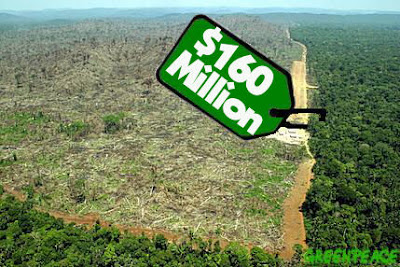18 April 2008
A New Oldest Tree Announced!
11 December 2007
The World Bank Pays Countries To Not Cut Down Forests
 A World Bank led plan was announced today that puts a price tag on remaining forests in developing countries whose citizens use deforestation as a means of income. A $160 million dollar donation from wealthy countries and a U.S. environment group, The Nature Conservancy aims to assist 20 countries that complete a first step under the new Forest Carbon Partnership Facility (FCPF). They then would be eligible to a "Carbon Finance Fund" under which they would be financially compensated for the carbon emissions saved by preserving their forests.
A World Bank led plan was announced today that puts a price tag on remaining forests in developing countries whose citizens use deforestation as a means of income. A $160 million dollar donation from wealthy countries and a U.S. environment group, The Nature Conservancy aims to assist 20 countries that complete a first step under the new Forest Carbon Partnership Facility (FCPF). They then would be eligible to a "Carbon Finance Fund" under which they would be financially compensated for the carbon emissions saved by preserving their forests.
"We must not lose another day when it comes to climate and forest protection. Forest protection must be a central element in a future agreement on climate change." said German Development Minister Heidemarie Wieczorek-Zeul in a statement.
Germany leads the front with the highest donation of $59 million dollars with Britain providing $30 million, the Netherlands contributing $22 million, Australia and Japan giving $10 million dollars each, France and Switzerland with $7 million dollars.
While the U.S. did not officially take part with the meetings in Bali, The Nature Conservancy did participate and donate, along with Denmark and Finland, a generous $5 million dollars. Source.
Tags: Deforestation, FCPF, The Nature Conservancy, The World, Trees, World Bank
04 December 2007
Best Week Ever: Trees.
 Earlier this week Indonesia decided that it was time to enforce stricter deforestation laws, today the results of a new study is also in favor of the trees.
Earlier this week Indonesia decided that it was time to enforce stricter deforestation laws, today the results of a new study is also in favor of the trees.
Five world renown organizations,
World Agroforestry Center (ICRAF),
the Center for International Forestry Research (CIFOR),
the International Center for Tropical Agriculture (CIAT),
the International Institute for Tropical Agriculture (IITA),
and the Consultative Group on International Agricultural Research (CGIAR), have conducted a study on the financial stability of deforestation, for the past 20 years, and presented the results at the UNFCC Conference in Bali.
The outcome?
With the economy changing to favor environmentally friendlier products and with the market for carbon credits on the rise, in some places mandatory, it is costing major deforestation countries more to cut down the trees then to actually leave them in the ground.
Southeast Asia, Central Africa and the Amazon Basin were all found to bring in less then $5 per every ton of carbon they released. While US and European buyers are paying upwards of $35, 23 Euros, to offset a one ton reduction in carbon emissions.
"Deforestation is almost always driven by a rational response to what the market values and for some time now, it has just made more financial sense to many people in forested areas to cut down the trees," said Brent Swallow, leader of the study and Global Coordinator of the Partnership for Tropical Forest Margins. "What we discovered is that returns for deforestation are generally so paltry that if farmers and other land users were rewarded for the carbon stored in their trees and forests, it is highly likely that a large amount of deforestation and carbon emissions would be prevented."
The report observes that offering economic repayment for carbon storage, keeping the trees alive, would be effective to recover the lost income from their carbon emissions not to mention rebuild ecosystems & prevent countless species from becoming extinct.
Tags: Africa, Amazon Basin, Asia, Carbon Emission, CGIAR, CIAT, CIFOR, Deforestation, ICRAF, IITA, Trees, UNFCC









